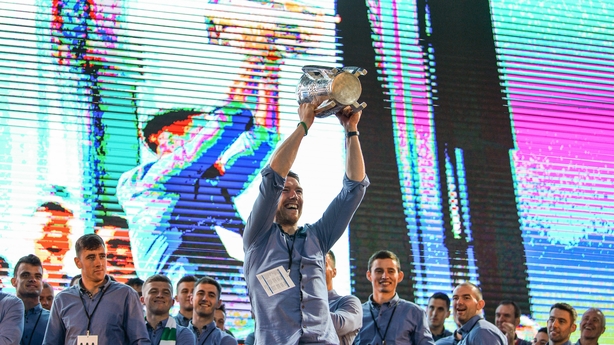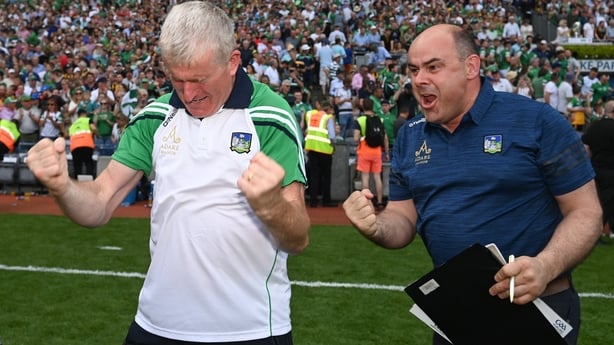We're living in an era of Limerick supremacy and for perhaps the first time, 'the big three' itself is in danger of becoming a misnomer.
In 2022, they became the first team outside that aristocratic trio to win three-in-a-row - Kilkenny doing it last in the late 2000s, Cork in the late 70s and Tipperary in the early 50s.
From this remove, it's hard to credit how abrupt their rise to glory was back in 2018, or at least how abrupt it seemed to those who hadn't checked under the bonnet.
John Kiely's first year in charge of the seniors in 2017 didn't offer many hints of what was to come. Limerick were eliminated in Munster by Clare, after which Ger Loughnane dismissed his county's prospects on the grounds that their opposition was so poor. They were subsequently knocked out altogether by an out-of-sorts Kilkenny in a Nowlan Park qualifier, the quality of the match panned by all and sundry.
Just over 13 months later, Limerick would be All-Ireland champions for the first time in 45 years.
Seamus Hickey, a stalwart for over a decade, posed with his kids and the Liam MacCarthy Cup on the pitch afterwards, in what would be his last involvement with Limerick as a player.
"It's something I reflected on in the years after. It was time to go for me," Hickey told RTÉ Sport at last week's GAAGO launch.
"I absolutely was driven and loved being part of a group and Limerick teams for years. To step away from that was tough. Because I knew they would go on and do great things. That was hard.
"But it was my family that told me that I had to step away. At 30 years, going on 31, I was relatively young but life had passed me by at that stage.
"The effort and the focus and commitment that is required to be part of such a high functioning set-up as an amateur, and have a day job, a wife and family – if hurling was my living, and providing that living, as a family man, you could justify that commitment. But for me, it wasn't justifiable."

Hickey is primarily associated with the previous era of Limerick hurling, as they recovered from their 2010 nadir when a players' strike resulted in an entire year being written off.
He had earned the Young Hurler of the Year award in his first championship campaign in 2007, as Limerick made a leftfield run to the All-Ireland final, though later admitted that he struggled badly on Eddie Brennan in the decider.
Hickey was latterly a key figure in the runs to the All-Ireland semi-finals in 2013 and 2014, the former after a long-awaited Munster title, taking home the Player of the Match award despite the two-point loss to Kilkenny in the '14 semi, famously played in monsoon conditions. (Hill 16 was half emptied at one point in the second half as supporters darted under the bowels of the terrace for cover, the writer being among that brief exodus...)
He hung around just long enough to claim an All-Ireland medal in 2018, starting only the opening round robin victory over Tipperary and coming on late in normal time against Cork in the semi-final epic. He was an unused substitute in the final.
Cork footballer Anthony Lynch, two-time All-Star and one of the county's best defenders in the 2000s, finally won an All-Ireland title in similar circumstances in 2010 and would afterwards bristle at the suggestion that the medal meant any less to him as a result, rightly insisting he had done more than enough to earn it.
"(The likes of) Gavin O'Mahony, Wayne McNamara retired literally the year before we broke through," says Hickey.
"Then you’re talking about the great men of the 80s, men from the 90s like Ger Hegarty whose son breaks through. Ger was a huge part of the success of the 90s.
"The Nashes. Joe Quiad. Ciaran Carey. It goes on. These are all men who gave enormous service to Limerick, and who I idolised. But they didn’t have the Celtic Cross at the end. I did have the Celtic Cross.
"But I only started one game that year, came on in two. And that was different to the previous 10 years I played.
"So you don’t get to control the script sometimes. It is probably humbling when you reflect on it. it’s only when you step off the carousel that you reflect on the games, your career, and the quirks of winning and losing.
"It did hit me afterwards that I was a very, very fortunate Limerick man to leave at the time I left."
What has happened since has altered the hurling landscape.
No county outside of the big three has ever established such a reign of dominance. Galway flirted with doing so in the late 80s, though Tipperary were always along for the ride and denied them their 'three-peat' in contentious circumstances in '89. Clare, under Loughnane, were the team of the late 90s but their bid for a third title in four seasons in '98 was derailed amid disciplinary storms and stopwatch mishaps.
Limerick of the early 2020s, by contrast, have broken new ground. The old fatalism has withered away, replaced by serene confidence. Their capacity for heartbreak had its limit after all.

There were more than a few straws in the wind that Limerick could become a potent force in the game. At the end of 2017, with their seniors kicking their heels since mid-summer, they demolished Wexford in the All-Ireland U21 final in Thurles, their second title at the grade in three years. This in itself was no guarantee. Limerick had blown it at senior level with an even more decorated crop who completed three-in-a-row at the same age grade in the early 2000s.
Hickey, however, having glimpsed the emerging generation in the twilight of his own career, was confident this was coming.
"The only surprise to me the last four years was that they lost the semi-final to Kilkenny in 2019, genuinely," insists Hickey.
"In 2018, I felt we achieved ahead of schedule. They were an ascending group of players. The under-21s, the All-Irelands that they won, they didn't just win them, they dominated them. To me, that was telling, the physical stature of the players coming up. So you had physique, pace, skill – the trifecta that you can’t design, that either comes through in a generation or it doesn’t.
"Kilkenny came through in a generation. When you’re talking about the likes of Peter Barry, Martin Comerford – size, speed, skill. Henry Shefflin. If you had a prototype hurler, Limerick had seven or eight of them come along together. To me, the writing was on the wall.
"And they were ambitious, hungry to succeed. They had come from colleges and schools programmes, Harty Cups, Fitzgibbons, that were used to nothing but winning. It’s very hard then to step into a county set-up and accept losing. Or be comfortable with losing, when you’re a natural winner from underage right the way through.
"I suppose that was testament to the underage hurling academies that Joe McKenna headed up. The Limerick five-year plans that were put in and around the academies. That it was the fruit of underage success. From years going by without being relevant at Tony Forristal level (U14) or underage to actually winning them and then sustaining that and getting used to winning. That was what was required to change a culture of being nearly there for 30, 40 years.
"It is an entire ecosystem, the same as I have seen in Dublin football. The ecosystem of desire to succeed, refusal to accept sub standard effort and commitment, that went from chairperson right the way down to the academy coaches and the players then as well.
"And John Kiely, a huge part in that in his ability to manage multiple expertise providers in terms of strength and conditioning, sports psychology. He's got a lot of experts he listens to and manages."
The 2022 title was significantly more hard earned than the romps in 2020 and 2021, though this is caveated by the absence of perhaps their most naturally gifted player, Cian Lynch.
While the age profile of the side is ideal, is there a sense that they are at least plateauing?
"If your plateau is multiple All-Ireland championships, then that's a fine plateau," notes Hickey.
"If you are talking about supply level and talent I do think there is an excellent structure in Limerick for academies but the generation that has come in and is currently there are in their mid to late 20s now. I don't think you replicate that.
"Kilkenny did not replicate that. Dublin football, you see with them now, you win as much as you can and then you try and sustain it beyond it with the fresh blood that comes in.
"But you will need that fresh blood. Limerick aren't at the re-blooding stage yet but I do think the core of that team is incredibly special.
"I agree (the gap is closing). If we look at the start of the 2022 championship, two of the favourites are non runners in Cork and Waterford so that was a huge surprise to me based on the young talent and the tenured management teams that they had.
"Limerick got beaten three times (and one draw) Which to me was hard to imagine 12 months previously. So I think on a game to game basis, six teams could definitely win it by winning a once off game against Limerick."
Should Limerick lift Liam MacCarthy again next year, then the five-in-a-row hype will naturally spring into overdrive, as it did with Kilkenny at the turn of the last decade.
The comparison between Cody's Kilkenny side of the late 2000s and the present Limerick team has become a familiar point of discussion.
"Kilkenny's four-in-a-row was only interrupted by Tipperary, they were one game away from seven in a row. So it's the nearest comparison. And the Dublin five-in-a-row team is again the nearest comparison. So success is one thing but then you are talking about success relative to the competition level.
"In 2021, for argument's sake, was there a team within 10 points of Limerick? Maybe Waterford?
"Winning close games repeatedly is grit, blowing out teams is excellence. The great teams are always the ones who separate themselves from the competition around them.
"And I think they have done that and that's why then, they are compared to the great teams because they have shown that they are. So to me, it's the only comparison available."


